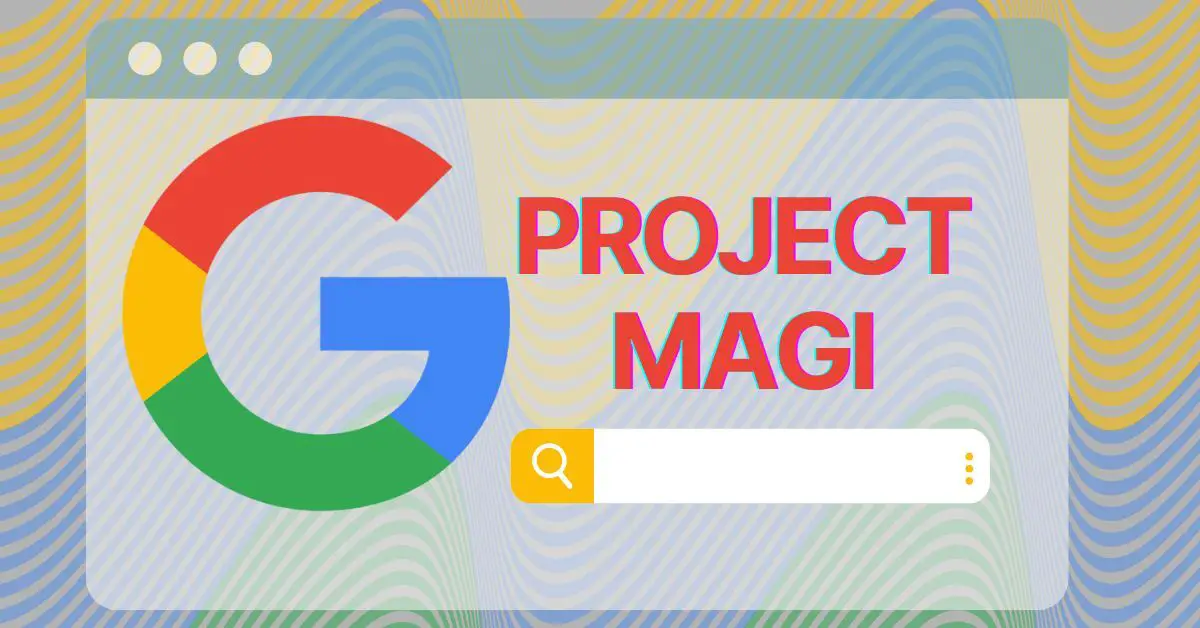
How Project Magi Will Impact the Advertising Industry

Get helpful updates in your inbox
Google has enjoyed virtually unrivaled success since their search engine became widely used in the early 2000’s. Their public IPO valued them at a whopping $23 billion dollars in 2004, and no company, product, or service has ever come close to even making a dent in their success ever since.
That is, until just a few months ago — when OpenAI’s ChatGPT program launched.
For the first time in Google’s history, it seemed to be caught unawares by an extraordinary new competitor in the field of technology and innovation. ChatGPT became the fastest-growing consumer product in history, and one of its main functions (providing users with answers to their questions) was an obvious threat to Google’s primary function as a search engine.
Of course, a company of Google’s sheer magnitude and resources wouldn’t wait long to address their competition; Google quickly announced the upcoming launch of Bard, their own generative AI to combat ChatGPT’s success. Furthermore, in a recent report by the New York Times from sources with insider knowledge on the project, word began leaking about Google’s Project Magi, a codename for a variety of new features projected to be integrated into their search engine, helmed by 160 full-time workers.
Although Project Magi is still heavily under wraps and Google has yet to publicly address many leaks, there are several key points to know about Google’s new endeavor. Here’s everything you need to know about Project Magi, and how it will impact the advertising industry for both advertisers and site owners who use Google’s features every day.
What is Project Magi?
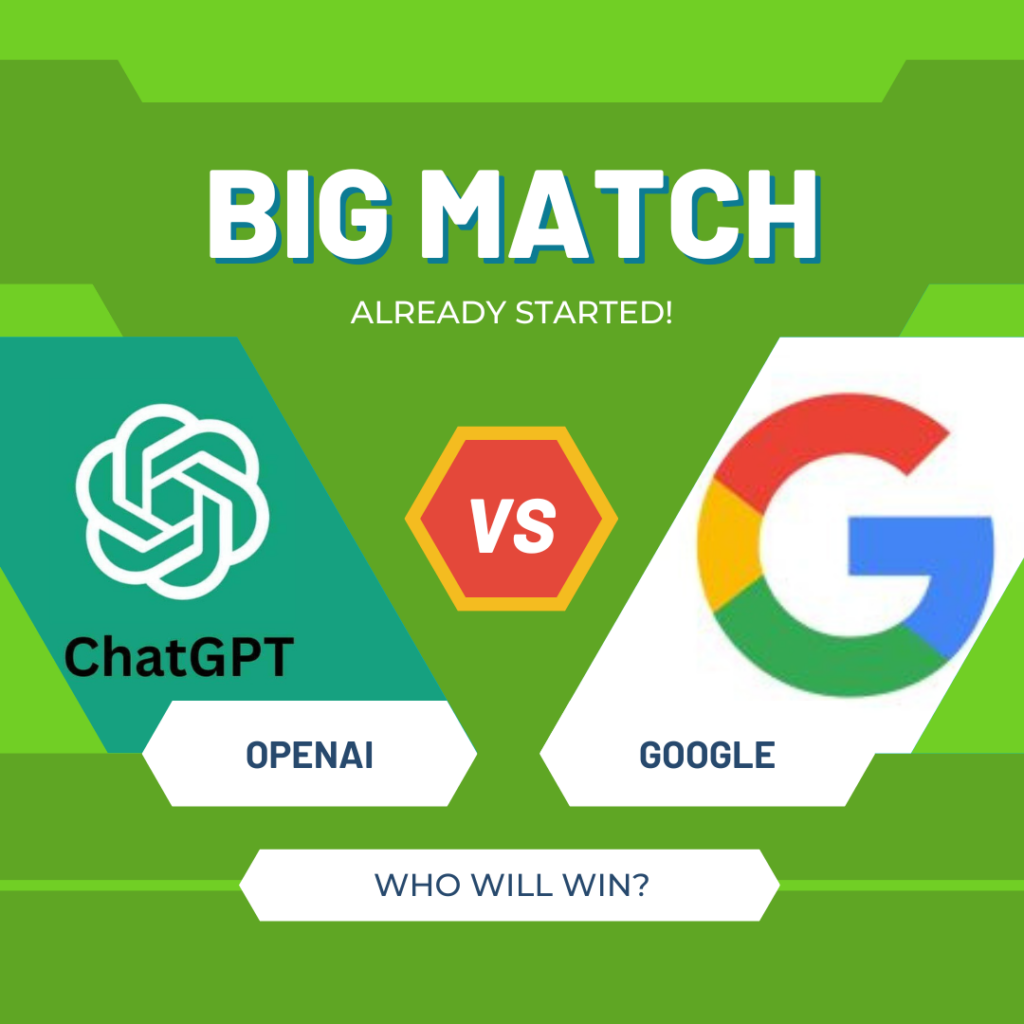
Simply put, Project Magi is a new kind of search engine from Google. Still under development, Google hopes these new features will have the potential to revolutionize the way that people search for information online.
For years, there has been growing public perception that Google — the most widely-used search engine in the world with a market share of 92% — has not been providing as high-quality answers to users. In a recent podcast, former Google executive and CEO of Yahoo! Marissa Mayer explained that incentives for SEO, a much broader and more vague internet landscape, and Google’s ad revenue model are all contributing factors to a perceived lowered quality in Google search results.
“When you needed some information, you just typed a few words into the search box and, very quickly, you got the answer you were looking for, usually from an authoritative source,” Mayer said. “But today? To me, at least, it doesn’t feel the same. My search results just don’t seem as useful. I feel like I’m seeing more ads, more links that might as well be ads, and more links to spammy web pages.”
This trend is also evident in other ways, like the rise of search queries including the term “Reddit” to bypass Google and go straight to a people-focused platform like Reddit. With the advent of popular and accessible tools like ChatGPT and a multitude of other rising AI stars like Bing Chat, Google needs to keep pace with their competitors or risk losing their throne to a committee of rivals.
Even though Google’s user numbers remain strong, Project Magi is obviously an attempt by Google to retain users and continue its dominance in the market through improved search functions. As the New York Times quoted, “The new search engine would offer users a far more personalized experience than the company’s current service, attempting to anticipate users’ needs.”
Project Magi appears to be centered around a few key concepts.
First, personalization. Project Magi will use AI to personalize search results for each user.
To approach this topic, I recommend listening to journalist and Atlantic staff writer Derek Thompson’s recent podcast interview, where he discussed what 21st century personalization really means. Here’s an excerpt of his interview (condensed for clarity, emphasis mine):
“You think of the 20th century as mass production + broadcast. Shows like Cheers are made to be watched by 50 million people and they’re broadcast to 50 million people. In the early 21st century, we moved to mass production + narrowcast. So you have art and entertainment that is made for tens of millions of people; but Facebook and Twitter and Instagram and TikTok feeds are all specific, they’re all narrowcast for you, so you’re getting an individualized slice of mass production.
What might happen in the future is that you get individual production + narrowcast. So ChatGPT writes just for you; if you and I prompt ChatGPT to write a Dick Wolf episode (of Law & Order), we will get two different Dick Wolf episodes. But how far does that personalization process go? Can you imagine AI songs written just for you? Can you imagine video games that change in response to individualized user requests so that in effect no one is playing the exact same game…we live in a world of fragmentation…How far can AI take that, where people can individuate their consumption of media so much that everyone is consuming their own personalized thing on their own narrowcast?”
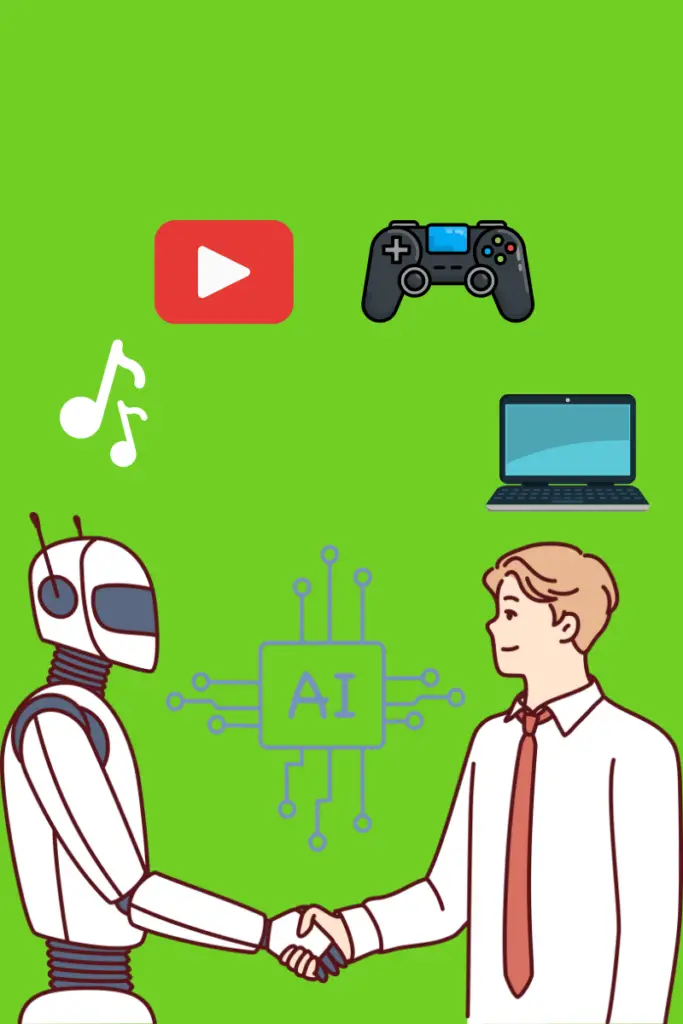
Personalization is becoming simultaneously more nebulous and important for users; with AI at the helm, users actually have the possibility to create unheard-of levels of personalization made just for them. One-size-fits-all media is becoming a thing of the past, and hyper-personalization is becoming a crucial determining factor in user queries, purchases, and overall perception of brands.
Project Magi is aiming to double-down on this trend, ideally making each user’s experience as personalized as possible. This means that the results of your Google searches will be tailored to your interests, past search history, and other factors. So, you’ll always see the most relevant and interesting results, no matter what you’re looking for.
Speaking of personalization, Project Magi also appears to be heavily learning into more conversational and casual dialogue with users. The crux of all current prominent AI tools, inputting simple conversational text into the tool has begun replacing the traditional search engine model.
In the past, users would type in questions or simple phrases to find more information around the topic (like “how do I train my dog to sit” or “dog sitting best practices”). With new AI tools, users are typing in more detailed lines of dialogue and receiving conversational responses in lieu of a dozen links to sponsored and organic websites that might have hundreds of pieces of content around the topic.
Here’s an example I had with ChatGPT and Bard about training your dog, with follow up questions and conversational dialogue:
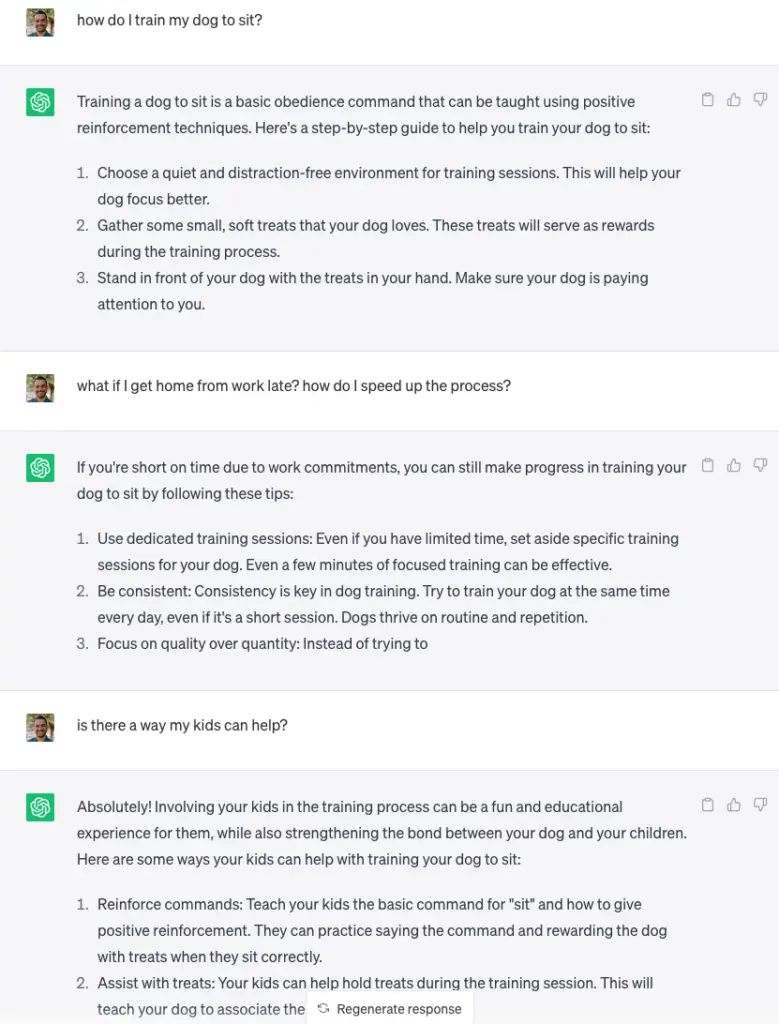
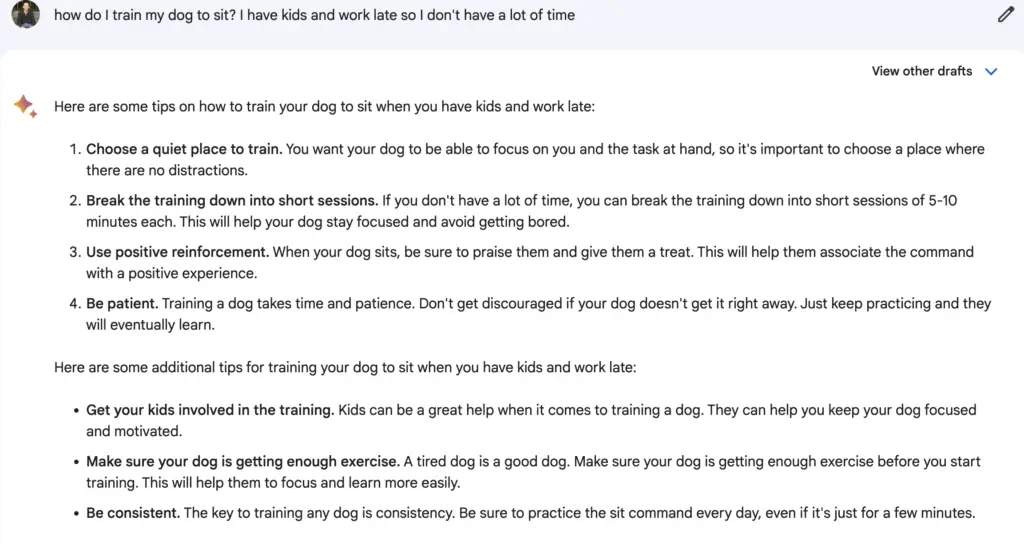
Google hopes Project Magi will allow users to interact with the search engine in a more conversational way. This means users can ask questions and get answers in a natural way instead of seeing a plethora of potentially unhelpful links that do little more than bring ad revenue to Google.
For instance, Googling the phrase “What’s the best restaurant in San Francisco?” typically spits out several sponsored posts (restaurants that are almost certainly not the “best restaurants” in San Francisco, since by default they have paid their way into the top results through money, not sheer quality), followed by several numbered listicle posts of varying opinions of the top restaurants:

Google ideally wants Project Magi to have more of a question/answer conversation with users to find their preferences and unique tastes. Although there are rumors of Google inputting ads into these AI search queries, this conversational AI dialogue process obviously turns their previous business model of traditional digital advertising on its head. Still, Google appears set on remaining competitive with new market behavior, sacrificing highly lucrative traditional advertising models to stay relevant in the marketplace.
Finally, AI-powered results. Obviously, Google has been using AI in their algorithm from the beginning, and this is nothing new for the tech giant. But Project Magi will aim to use AI to improve the quality of search results, going beyond the typical results users have been getting from the current Google search engine.
How Will Project Magi Impact Content Creators, Bloggers, and Publishers?
In addition to the features mentioned above, Project Magi is also expected to offer a number of other benefits for bloggers and content creators.
First, Project Magi will give creators more expanded ability to track the performance of their content and identify which keywords are driving traffic to their websites. This means that they will be able to see how many people are viewing their content, what keywords are driving traffic to their websites, and which pages are performing the best. This information can be used to improve the content that bloggers and content creators create and to make sure that they are reaching their target audience.
Next, Project Magi will allow bloggers and content creators to get feedback on their content from users. This feedback can be used to improve the content that bloggers and content creators create and to make sure that it is meeting the needs of their audience. Project Magi will also allow bloggers and content creators to connect with other bloggers and content creators in their niche. This can be a great way to collaborate on projects, share ideas, and learn from each other.
In addition to the benefits mentioned above, Project Magi is also expected to offer a number of other features that will be beneficial for bloggers and content creators. For example, Project Magi is expected to offer a number of tools that will help bloggers and content creators to create better content. These tools are expected to include things like a thesaurus, a style guide, and a plagiarism checker.
Project Magi is also expected to offer a number of resources that will help bloggers and content creators to learn more about search engine optimization (SEO). SEO is the process of optimizing a website or web page so that it ranks higher in search engine results pages (SERPs). By learning more about SEO, bloggers and content creators can improve their chances of their content being seen by more people.
Overall, Project Magi has the potential to be a major asset for bloggers and content creators. It will allow them to track the performance of their content, get feedback from users, and connect with other bloggers and content creators in their niche. This information and these connections can be used to improve the content that bloggers and content creators create and to make sure that they are reaching their target audience.
How Project Magi Will Impact Advertisers
One of the biggest changes that Project Magi will bring is the ability to handle transactions directly on Google. This means that users will be able to purchase products, book flights, and complete other transactions without leaving the search engine. This change is expected to integrate seamlessly with Google Pay, used by over 150 million users across 42 countries.
This change will have a number of implications for advertisers. First, it will make it easier for users to complete transactions, which could lead to an increase in sales. Second, it will give advertisers more control over the user experience, as they will be able to customize the checkout process to match their brand. Third, it could lead to a decrease in the cost of paid advertising, as advertisers will no longer have to pay for clicks that do not result in a sale.
In addition to the ability to handle transactions directly on Google, Project Magi is also expected to make use of artificial intelligence to improve the user experience. For example, Google could use AI to personalize search results based on the user’s past search history, location, and other factors. This could lead to an increase in the number of clicks that advertisers receive, as their ads will be more likely to be seen by users who are interested in their products or services.
Overall, Project Magi is expected to have a significant impact on advertisers. By making it easier for users to complete transactions and improving the user experience, Google could help advertisers to increase sales and decrease the cost of paid advertising.
Here are some specific ways that Project Magi could impact advertisers:
- Increased sales: Project Magi could make it easier for users to complete transactions, which could lead to an increase in sales for advertisers.
- Decreased cost of paid advertising: Project Magi could lead to a decrease in the cost of paid advertising, as advertisers will no longer have to pay for clicks that do not result in a sale.
- Improved user experience: Project Magi could improve the user experience for both advertisers and users, which could lead to an increase in clicks and sales.
Project Magi will use artificial intelligence (AI) to personalize search results for each user. This means that the results will be tailored to the user’s interests, past search history, and other factors. As a result, advertisers will be able to target their ads more effectively.
For example, an advertiser who sells shoes could target their ads to people who have searched for “running shoes” in the past. This would ensure that the ads are seen by people who are actually interested in buying shoes.
Project Magi will also make it easier for advertisers to measure the effectiveness of their campaigns. Google will provide advertisers with detailed data about how many people saw their ads, how many people clicked on their ads, and how many people converted into customers. This data will help advertisers to optimize their campaigns and get the most out of their advertising budgets.
Why Should Publishers Care About Project Magi?
Project Magi is the latest in a dizzyingly fast new age of the internet. For years, decades even, bloggers and publishers of all kinds have followed largely traditional SEO practices to get more organic traffic. Now, all that may be becoming a thing of the past, where generative AI and AI assistant tools may be helping users find information online far more than traditional search engines do.
That’s why it’s so important to follow along here and see how to position yourself and your content in this new age of AI. Generative AI is a rapidly developing field, and it is having a major impact on the world of content creation. ChatGPT and Bard are two of the most popular generative AI models, and they are already being used by professional bloggers to create high-quality content.
There are plenty of reasons why publishers should care about AI and developments in Project Magi. First, generative AI can help you to save time with your day to day work as a publisher — quickly generating content, fixing coding issues, creating outlines on a variety of topics, etc. This can be a major advantage for bloggers who are short on time.
Second, generative AI can help bloggers to improve the quality of their content. Generative AI models are trained on massive amounts of data, and they can use this data to generate content that is both accurate and engaging. This can help bloggers to attract more readers and to improve their search engine ranking.
Third, generative AI can help bloggers to reach a wider audience. Generative AI models can be used to translate content into different languages, and they can also be used to generate content for different platforms. This can help bloggers to reach a wider audience and to grow their business. How many more people might be able to read your content if it was translated into their native tongue, or delivered in a way (podcast, video, social media snippet, etc.) they normally consume content?
Most importantly, Project Magi signals a new way users may be getting the information they want online. There are thousands of companies whose sole purpose is to provide SEO services to publishers; this industry regularly sees tens of billions of dollars in revenue each year. But things may be changing, both for search engine optimizers and content creators.
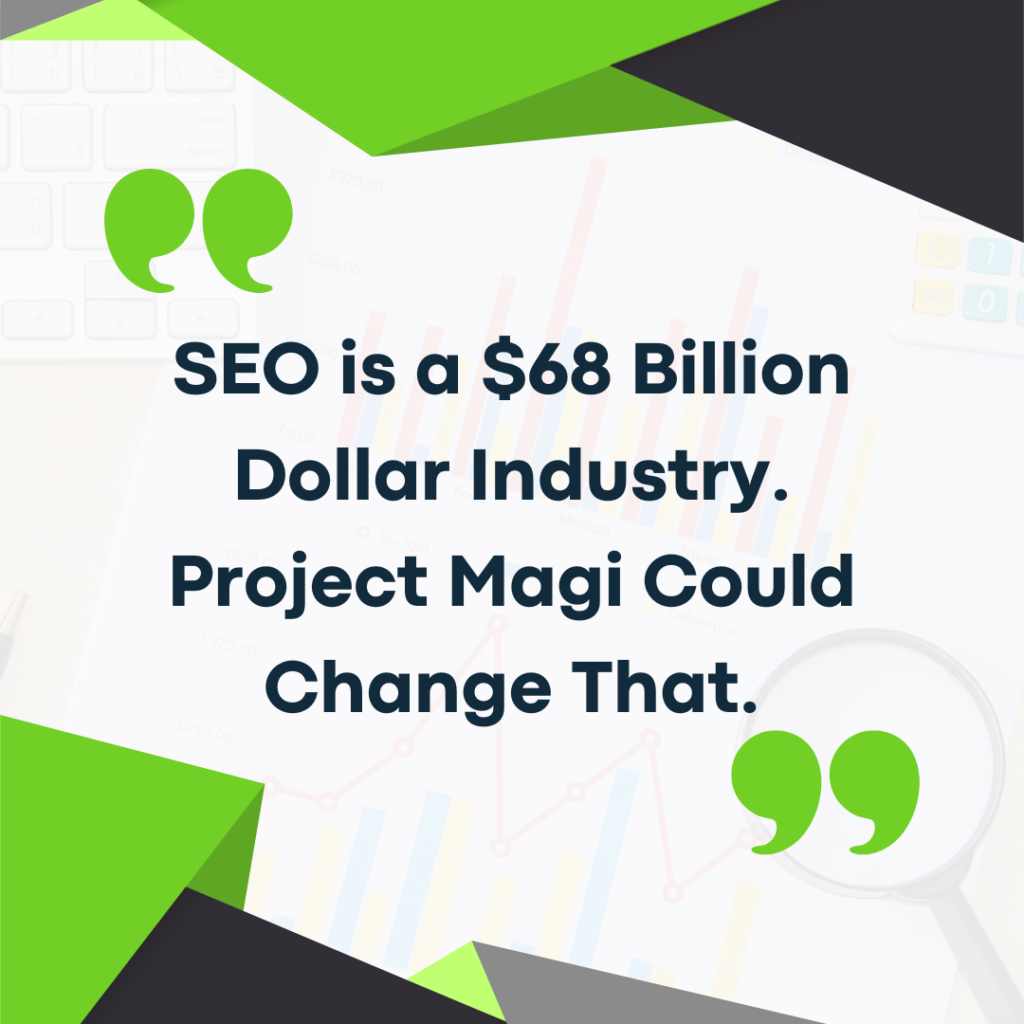
Privacy, accessibility, and accuracy are becoming more important; it seems like Facebook’s parent company Meta is sued every time you look at the news for some violation of privacy or failure to provide security. Google is currently under investigation by the US Justice Department for monopolizing digital technology.
Project Magi is a move by the tech giants of the world to try and adapt to this new and changing internet landscape; publishers unwilling to adapt may become extinct as well.
In Conclusion
Project Magi is a major undertaking for Google, and it is still too early to say how successful it will be. However, if it is successful, it could revolutionize the way that people search for information online. This will have a significant impact on the advertising industry, and it will create new opportunities for both advertisers and content creators.
One of the main features of Project Magi is personalization. The search engine will use AI to personalize search results for each user based on their interests, past search history, and other factors. This will provide users with more relevant and interesting results. For advertisers, this means they can target their ads more effectively, reaching users who are genuinely interested in their products or services.
Project Magi also emphasizes conversational and casual dialogue with users. Instead of traditional search queries, users will be able to input detailed lines of dialogue and receive conversational responses. This shift in search behavior will impact advertisers by changing the way ads are presented and potentially reducing the reliance on traditional digital advertising models.
AI-powered results are another focus of Project Magi. Google aims to use AI to improve the quality of search results beyond what the current search engine offers. By leveraging AI, Google can enhance the user experience and provide more accurate and valuable information.
For content creators, bloggers, and publishers, Project Magi offers several benefits. It will provide them with expanded tools to track the performance of their content, identify keywords that drive traffic, and receive feedback from users. Project Magi will also offer resources to improve search engine optimization (SEO) and help content creators reach their target audience more effectively.
In terms of the impact on advertisers, Project Magi introduces the ability to handle transactions directly on Google. Users will be able to make purchases, book flights, and complete other transactions without leaving the search engine. This seamless integration with Google Pay can increase sales and give advertisers more control over the user experience. Additionally, Project Magi’s use of AI in personalized search results can lead to higher click-through rates and a decrease in the cost of paid advertising.
Overall, Project Magi represents a shift in the way users interact with search engines and consume information online. It emphasizes personalization, conversational dialogue, and AI-powered results. Advertisers will need to adapt their strategies to leverage these changes and take advantage of the opportunities offered by Project Magi. Similarly, content creators should stay informed and explore how generative AI models can enhance their work in this evolving landscape.

Anthony Moore is a writer, speaker, and coach. He's helped hundreds of entrepreneurs create successful businesses, and has gained over 7 million views for his work on entrepreneurship, personal growth, and productivity.
Featured Content
Checkout this popular and trending content

Ranking In Universal Search Results: Video Is The Secret
See how Flickify can become the ultimate SEO hack for sites missing out on rankings because of a lack of video.
Announcement

Ezoic Edge: The Fastest Way To Load Pages. Period.
Ezoic announces an industry-first edge content delivery network for websites and creators; bringing the fastest pages on the web to Ezoic publishers.
Launch

Ezoic Unveils New Enterprise Program: Empowering Creators to Scale and Succeed
Ezoic recently announced a higher level designed for publishers that have reached that ultimate stage of growth. See what it means for Ezoic users.
Announcement
